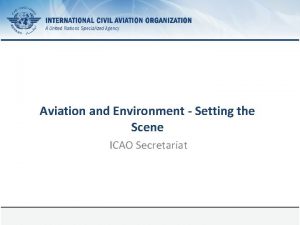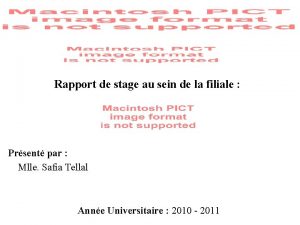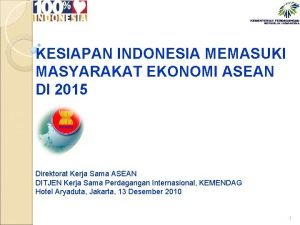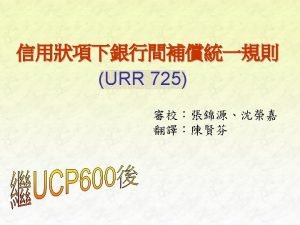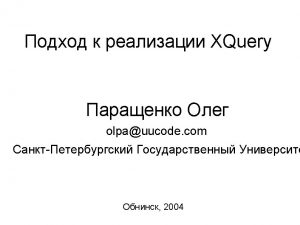UN Secretariat Article 97 The Secretariat shall comprise












- Slides: 12

UN Secretariat Article 97 The Secretariat shall comprise a Secretary-General and such staff as the Organization may require. The Secretary. General shall be appointed by the General Assembly upon the recommendation of the Security Council. He shall be the chief administrative officer of the Organization.

UN Secretariat Article 100 In the performance of their duties the Secretary-General and the staff shall not seek or receive instructions from any government or from any other authority external to the Organization. They shall refrain from any action which might reflect on their position as international officials responsible only to the Organization.

UN Secretariat Article 101 The staff shall be appointed by the Secretary-General under regulations established by the General Assembly. The paramount consideration in the employment of the staff and in the determination of the conditions of service shall be the necessity of securing the highest standards of efficiency, competence, and integrity. Due regard shall be paid to the importance of recruiting the staff on as wide a geographical basis as possible.

UN Secretariat UN Administrative Tribunal, established by the GA (7 judges, no appeal against judgments). ICJ Advisory Opinion (1954): - establishment of the Tribunal is in conformity with the Charter; - GA cannot review the judgments of the Tribunal. Replaced by a two-tier system (UN Dispute Tribunals + UN Appeals Tribunal) in 2009.

UN Secretariat Article 105 The Organization shall enjoy in the territory of each of its Members such privileges and immunities as are necessary for the fulfilment of its purposes. Representatives of the Members of the United Nations and officials of the Organization shall similarly enjoy such privileges and immunities as are necessary for the independent exercise of their functions in connection with the Organization.

Economic and Social Council Article 61 The Economic and Social Council shall consist of fifty-four Members of the United Nations elected by the GA. …eighteen members of the ECOSOC shall be elected each year for a term of three years. A retiring member shall be eligible for immediate re-election. Each member of the Economic and Social Council shall have one representative.

Voting procedure in the Economic and Social Council Article 67 Each member of the Economic and Social Council shall have one vote. Decisions of the Economic and Social Council shall be made by a majority of the members present and voting.

Economic and Social Council Subsidiary bodies: 1) Functional Commissions (e. g. Social Development, Women, Narcotic Drugs, Crime Prevention, Forests); 2) Regional Commissions (Africa, Asia and the Pacific, Latin America and the Caribbean, Europe, Western Asia); 3) Committees and Expert Bodies.

Trusteeship Council Article 86 The Trusteeship Council shall consist of the following Members of the UN: a. those Members administering trust territories; b. such of those Members mentioned by name in Article 23…; and c. as many other Members elected for three-year terms by the GA as may be necessary to ensure that the total number of members of the Trusteeship Council is equally divided between those Members of the UN which administer trust territories and those which do not.

International Court of Justice Article 92 The International Court of Justice shall be the principal judicial organ of the United Nations. It shall function in accordance with the annexed Statute, which is based upon the Statute of the Permanent Court of International Justice and forms an integral part of the present Charter.

International Court of Justice Article 93 All Members of the United Nations are ipso facto parties to the Statute of the International Court of Justice. A state which is not a Member of the United Nations may become a party to the Statute of the International Court of Justice on conditions to be determined in each case by the General Assembly upon the recommendation of the Security Council.

International Court of Justice Article 96 The General Assembly or the Security Council may request the International Court of Justice to give an advisory opinion on any legal question. Other organs of the United Nations and specialized agencies, which may at any time be so authorized by the General Assembly, may also request advisory opinions of the Court on legal questions arising within the scope of their activities.
 The views of ____ comprise the generalized other.
The views of ____ comprise the generalized other. Path synoynm
Path synoynm What comprise a community
What comprise a community A cohesive marketing mix and the related budget comprise
A cohesive marketing mix and the related budget comprise Hyperboles in romeo and juliet
Hyperboles in romeo and juliet International meat secretariat
International meat secretariat Secretariat scene
Secretariat scene Secretariat family tree
Secretariat family tree Premiere page du rapport de stage
Premiere page du rapport de stage Unep secretariat
Unep secretariat Literacy and numeracy secretariat
Literacy and numeracy secretariat Asean secretariat
Asean secretariat Pacific island forum secretariat
Pacific island forum secretariat






